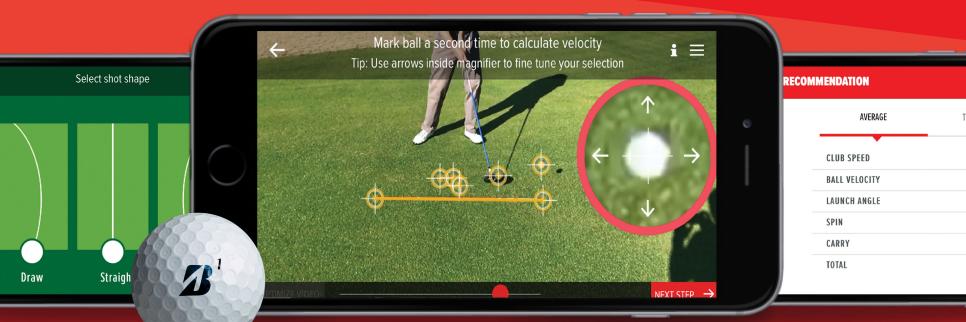News
Bridgestone BFIT app shows you don't need a $20,000 launch monitor to find the right ball—your iPhone now will do just fine

Bridgestone believes ball fitting should be as ubiquitous as the phone in your pocket, and it believes its new BFIT app is the solution.
Bridgestone's BFIT app allows your iPhone to be used as a virtual launch monitor to determine clubhead speed, ball speed, launch angle and distance. That data is combined with the user’s own assessment of the type of ball he or she normally plays, his or her typical ball-flight height and shape and any preferred ball performance characteristics (distance, accuracy, spin). It’s then put through the company’s ball-fitting algorithm to determine the ideal Bridgestone ball for each player’s game.
Bridgestone has been bringing high-tech, launch monitor-driven ball fitting to the masses for the better part of a decade. The company has done more than 350,000 ball fittings and analyzed more than two million swings in developing the new app over the last five years. One reason for the wait was to get the iOS camera technology to speed up to make it useful for golf purposes. (A version is also soon to be released for Android devices.) In essence, the app is a virtual replacement for the one-on-one ball fitting experience Bridgestone has been providing in the field.
“We’ve tried to make this more user friendly, more accessible to get more golfers past the barrier of a ball fitting,” said Bridgestone’s Adam Rehberg. “Even as much as we’ve been out there, a ball fitting is still a pretty exclusive process. Now, you’ll be able to do it anywhere. We hope this opens the floodgates to where more people understand launch conditions and how a particular ball can improve their game.”
Using the phone’s video camera, a player uses the app to track the movement of the club and the ball within the camera frame. That positional data is used to determine the key launch monitor parameters of club and ball speeds, as well as launch angle and spin.
Based on that data, the BFIT app recommends a specific ball that might better approach ideal launch conditions. For instance, the company’s lower-launching Tour B330 ball might be recommended for a high-swing speed player who is launching the ball on an angle that’s higher than what Bridgestone engineers have determined to be optimal.
The player’s individual profile is a key part of the ball fitting algorithm on the BFIT app, too. Rehberg says it would make no sense for the app to recommend a $45-a-dozen ball if a player prefers to use balls that cost around $25 a dozen or less.
“We don’t feel like there will be a predominant ball that the app recommends because the app incorporates so much more than the launch conditions,” Rehberg said.
The BFIT app, which is free from the App Store, does require a playing partner to record the video, but it also includes a component that allows users to share their swings, data and results through social media.

